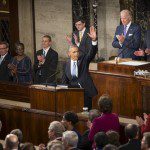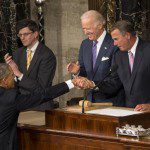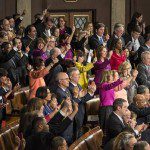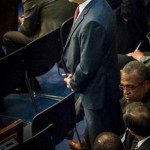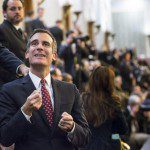GOP? What GOP Takeover, Asks POTUS at SOTU
By • January 29, 2015 0 1225
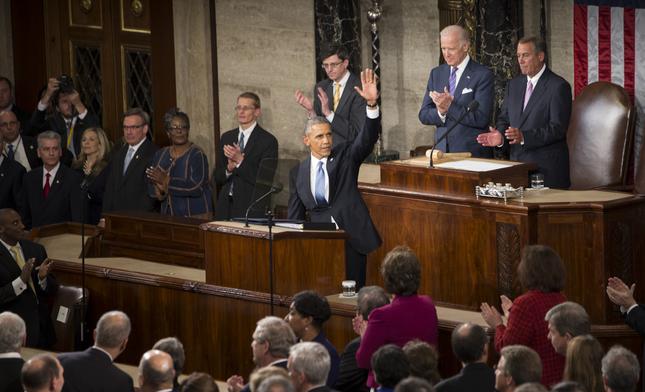
Was it just last November that the Republicans won their shot to take control of the Senate this month, added to their numbers in Congress and routed the Democrats by running mainly against the policies and the poll numbers of President Barack Obama?
If you were watching President Obama’s sixth State of the Union (SOTU to acronym lovers in the media and policy circles) address, you might be excused if you thought that he—aka POTUS, the President of the United States—didn’t get the message.
In a robust, sometimes rambling, Tony-the-Tiger speech that seemed to be full of confidence and sometimes questionable bravado, the president seemed to be announcing that things were swell, because his policies had been vindicated and worked.
He could indulge in a little chest-beating—the stock market was at record highs, jobs were going up, although wages did not follow, the unemployment rate was at its lowest since before the recession, lower gas prices for whatever reasons were allowing people to spend and/or save, and expanded health care coverage (never mind that the GOP will still be trying to repeal it, and it was all because he had been right all along).
Even his startling Cuban initiative, these days, has been a popular choice if polls are any indication.
The one thing that people remain mad about is the lack of amity in Washington, which the president didn’t exactly help. While talking about cooperation and bi-partisan efforts—perhaps on tax reform, trade, and other possibilities—he also rolled out the veto card time and again, on environmental matters, sanctions against Iran and other issues.
Obama offered up free community college tuition for everyone, easing tax credits for college education, expanded sick leave for parents, more focus on early childhood education.
He barely said anything about the thorny issue of immigration reform, touched somewhat disingenuously on the battle against Isis and terrorism in the Middle East, promised to safeguard privacy for internet users.
He also spent precious little time on foreign policy, which is—day-by-day—becoming increasingly important. He seemed to be operating in a time lag against events—Yemen, which allows the U.S. bases from which to launch drone strikes, seemed to be collapsing, the backlash against the use of images of the prophet goes on relentlessly, and Isis is holding or making gains in Iraq and Syria, something he did not seem to be aware of.
Still, these SOTUs are more often than not about appearances, emotions, story-telling, scenes from the crowd, claims and counter-claims, the poker faces of the listeners, the size and length of applause and where it is coming from, in the sometimes devilish details.
The president always speaks at the podium, as the vice president and the house speaker frame a kind of living background. Thus, you were faced with Vice President Joe Biden’s sometimes grim smile and the appearance of House Speaker John Boehner, who appeared to be battling a cold. You could pretty much tell how the politics of legislation would go this year by how many times Biden stood up and how many times Boehner did not. Mention of vetoes seemed only to deepen the speaker’s grim demeanor.
The president used one middle class family as an illustration about the ebb and flow of the struggle to stay above financial waters. The middle class, in fact, will be the battleground in coming elections and in battles over issues.
The media made much of the lack of amenity at these affairs, all rituals aside. When the president noted that there would be no more campaigns for him, there was a ripple of laughter from the GOP side, or perhaps a sigh of relief. Duly noted by the president, who shot back: “That’s because I won two of them.”
Some media types suggested that this was not the way to work towards bipartisanship, that it was an ill-mannered comment, somewhat like goading a bull with a reminder of his wounds.
Good grief.
Rhetorically, Obama regained his stride after that, heading into the home stretch with a blast from the past and a little bit of hope and change and a lot of optimism, climaxing with “We’ve laid new foundations. A brighter future is ours to write. Let’s begin this news chapter together—and let’s start the work right now.”
Sen. Joni Ernst, the newly elected Iowa Republican and the first female senator from Iowa, gave the opposing party’s rebuttal. Ernst grew up in rural Iowa and recalled having only one good pair of shoes, working construction and plowing her family farm fields. She said the Obama years were time of suffering and hardship and disunity, blaming Obama and Washington, D.C. She pledged that the new Republican congress would be reformed by the new majority. She also called Obamacare part of a stale mind set and that Republicans would continue to fight to repeal and replace it.
- President Barack Obama waves goodbye at the end of his speech, marking the close of his sixth State of the Union address. | Erin Schaff
- Erin Schaff
- Nora Birch
- Erin Schaff

